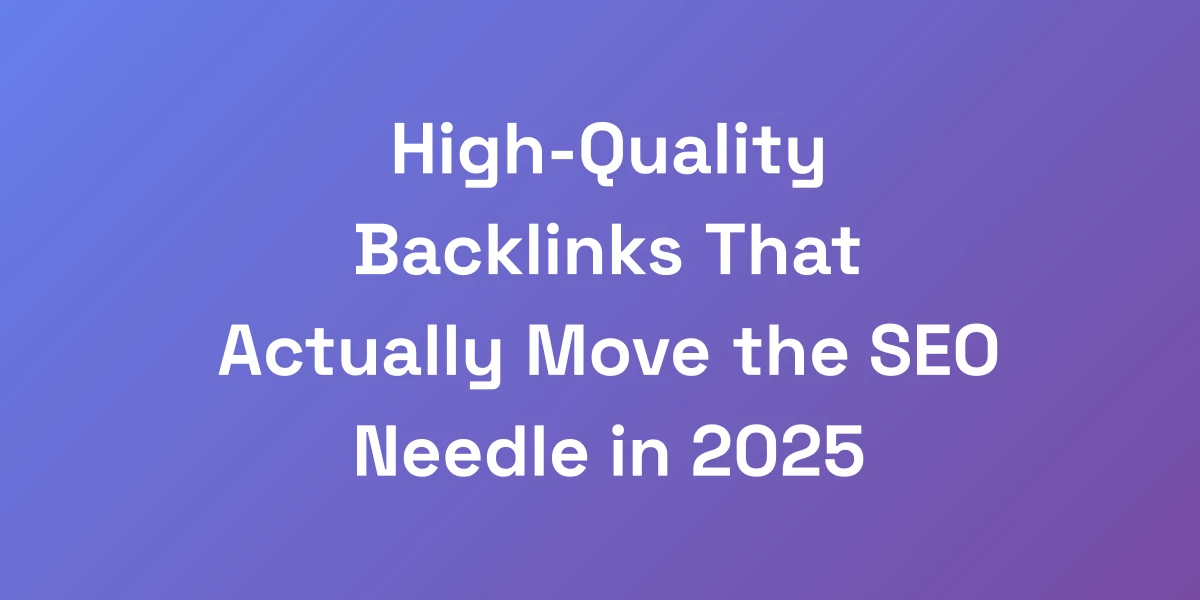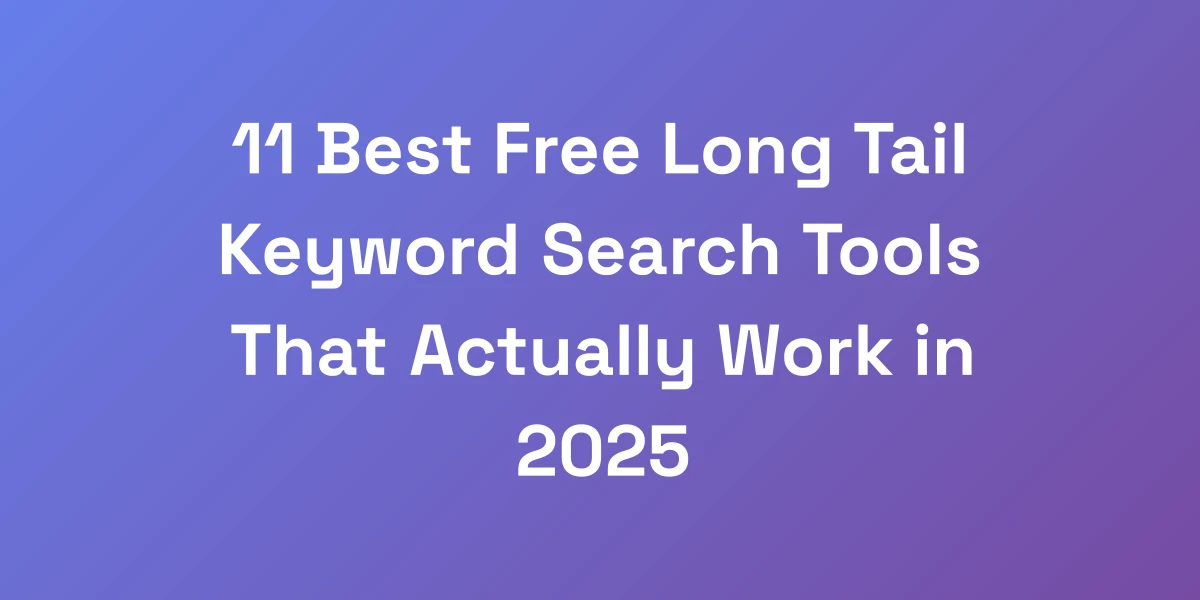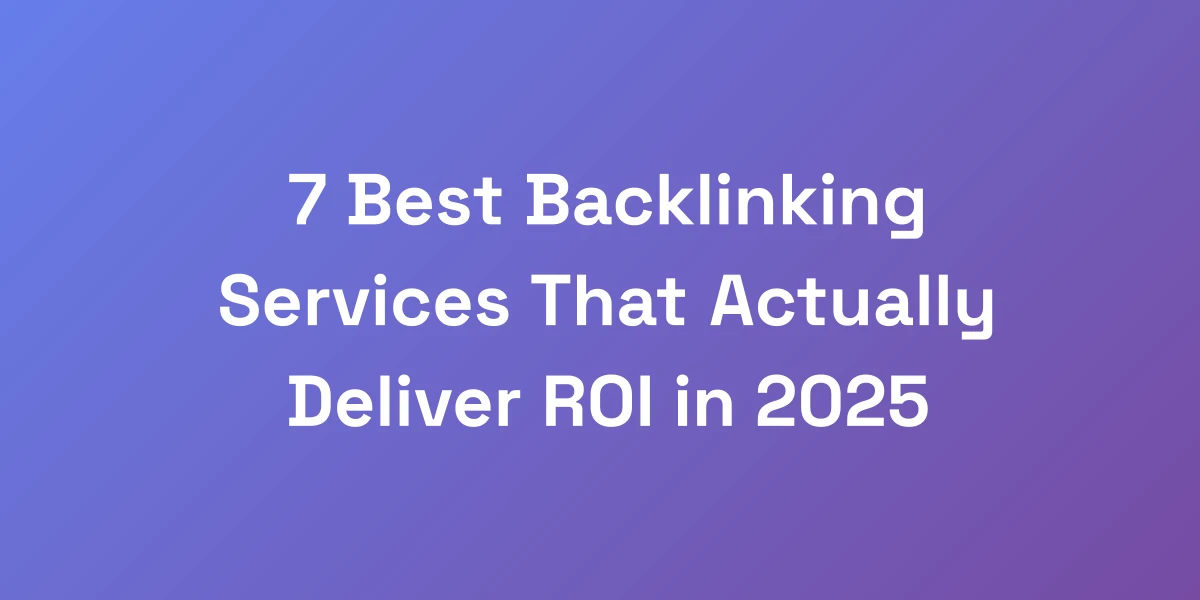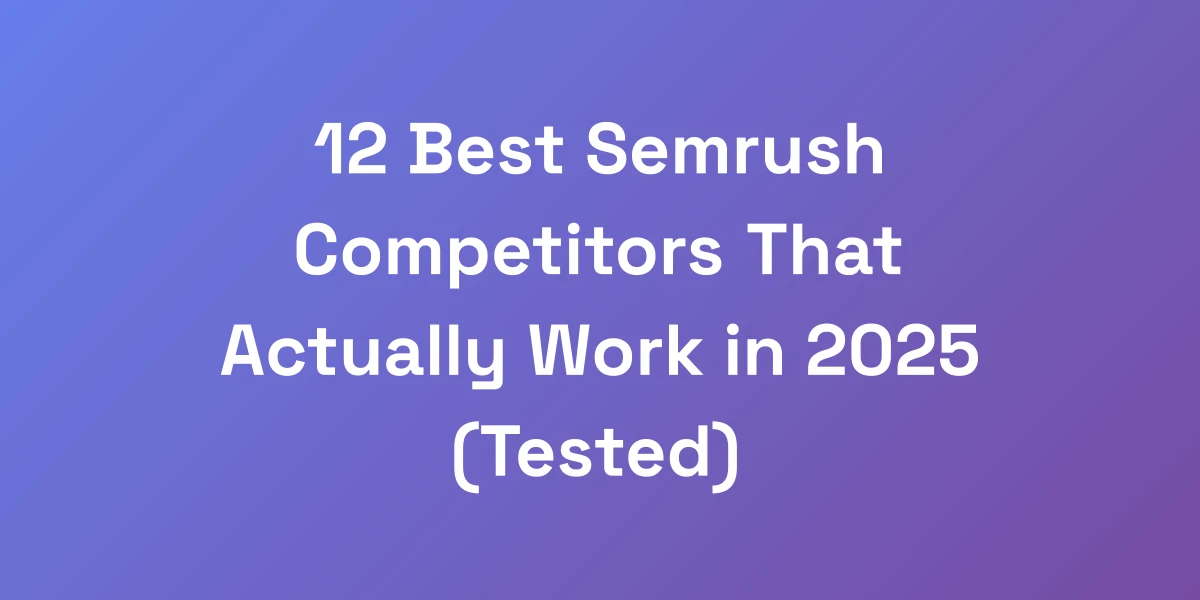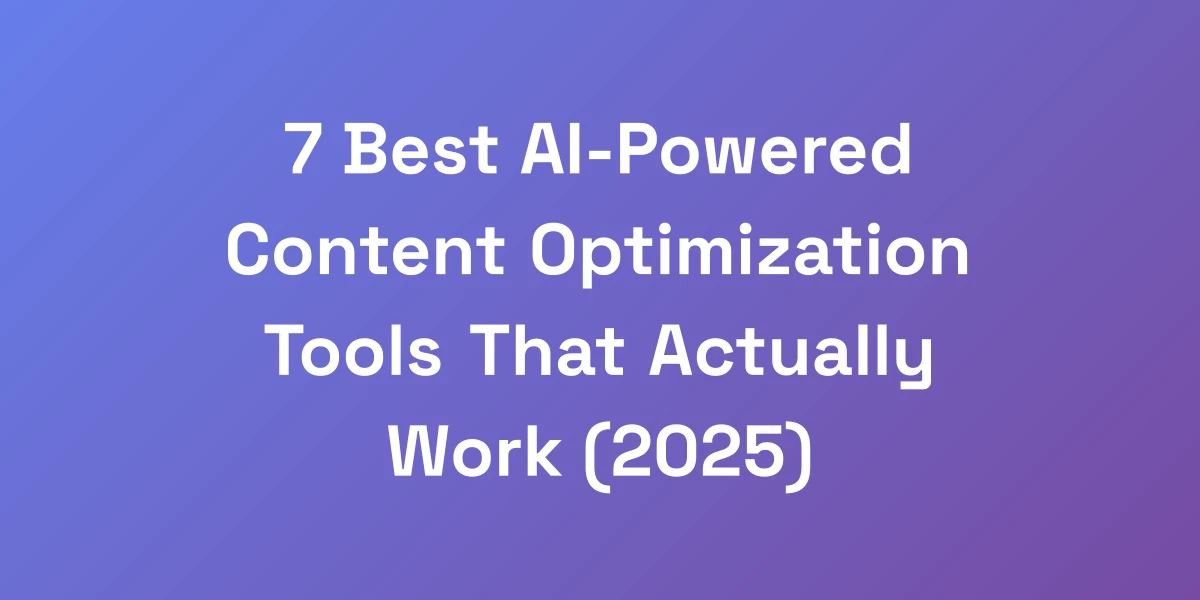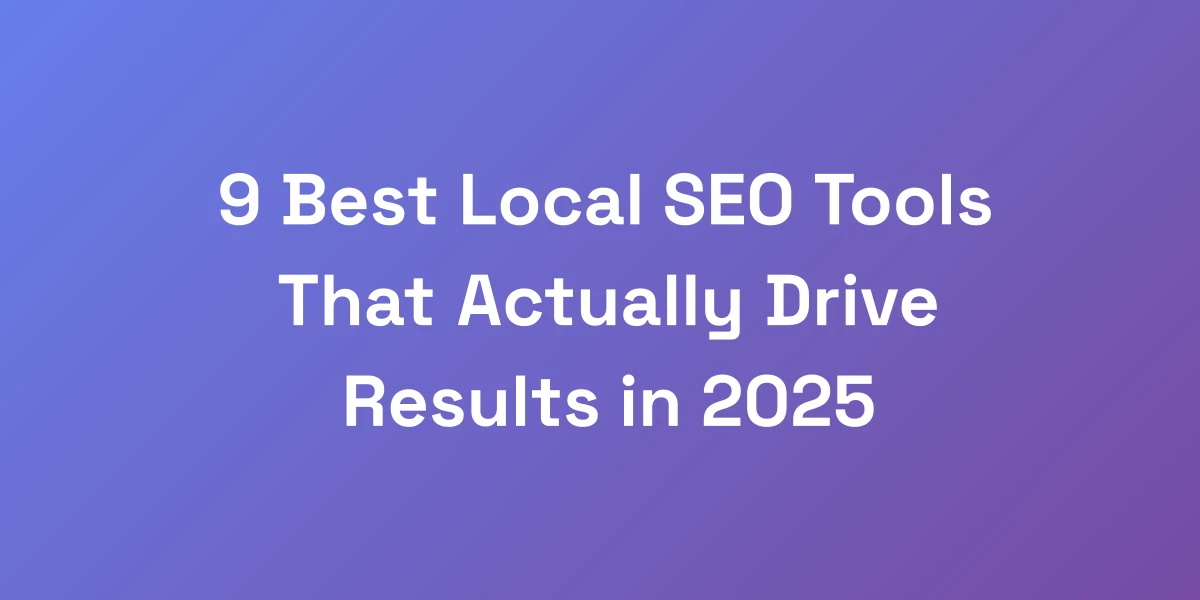7 Best Keyword Trackers That Actually Move the Needle in 2025
Mar 30, 2025 | By [email protected]
Introduction
Let’s get straight to the point. In the chaotic world of SEO, finding the right keyword tracker is like finding a needle in a haystack.
Most tools out there promise the moon but deliver nothing but fluff. We’ve all been there—scooping up data that doesn’t translate to real business growth.
But what if I told you there are seven keyword trackers that genuinely impact your bottom line? These aren’t just software; they’re strategic assets that drive revenue and streamline your SEO efforts.
Stick with us, and by the end of this article, you’ll know exactly which tools can take your SEO game from mediocre to stellar in 2025.
Why Most Keyword Tracking Tools Are Wasting Your Time and Money
Let me be direct: 90% of keyword tracking tools are giving you vanity metrics that don’t translate to revenue. I’ve spent millions on marketing, and here’s the brutal truth – you need a keyword tracker that drives real business outcomes, not just pretty charts.
The difference between success and failure isn’t in tracking more keywords; it’s in tracking the right keywords with the right tool that aligns with your revenue goals. Let’s cut through the BS and focus on what actually works.
The Hidden Cost of Poor Keyword Tracking
Investing in the wrong keyword tracker isn’t just a waste of money—it’s a hidden cost that silently drains your resources. Imagine pouring funds into a tool that repackages data without actionable insights.
Without precise tracking, you’ll miss out on identifying high-value keywords that could drive traffic and sales. This oversight means you’re leaving money on the table, every single day.
Why Traditional Rank Tracking Fails
Traditional rank tracking tools often fail because they focus solely on rankings without context. Sure, seeing where you stand is useful, but it doesn’t tell the whole story.
What matters is not just ranking but understanding how those rankings convert to actual revenue. Without integrating SEO metrics with business outcomes, traditional trackers leave you guessing.
The Revenue-First Approach to Keyword Tracking
A revenue-first approach means selecting keywords that directly impact your business goals. It’s about aligning your SEO strategy with what drives sales and growth.
Instead of chasing every trending keyword, focus on those that resonate with your target audience and have a clear path to conversion. This strategic alignment ensures your efforts translate into tangible results.
Key Metrics That Actually Matter
Forget vanity metrics like sheer keyword count. Focus on metrics that drive revenue:
- Search Intent Fulfillment: Are users finding what they need?
- Conversion Rates: How many visitors convert into customers?
- Revenue Attribution: Which keywords are directly leading to sales?
These metrics provide a clearer picture of how your SEO efforts are contributing to your bottom line.
Setting Up Your Tracking for Success
Setting up your keyword tracking system correctly is crucial. Here’s how:
- Define Clear Goals: Know what you want to achieve—be it increased traffic, higher conversions, or boosted sales.
- Select Relevant Keywords: Focus on keywords that align with your business objectives.
- Integrate with Analytics: Connect your tracker with tools like Google Analytics to get comprehensive insights.
Proper setup ensures that your tracker provides meaningful data that drives actionable decisions.
The Only 7 Keyword Trackers Worth Your Investment
After testing virtually every bulk keyword tools pricing guide on the market, I’ve narrowed it down to seven tools that deliver actual ROI. These aren’t just tools; they’re profit-generating machines when used correctly. Each one has been battle-tested in my own businesses and those of my clients.
What sets these apart isn’t their fancy features – it’s their ability to directly impact your bottom line through actionable insights and revenue-focused tracking.
Ahrefs: The All-in-One Powerhouse
Ahrefs stands out with its comprehensive SEO suite. Starting at $129/month for 750 keywords, it offers more than just keyword tracking.
- Backlink Analysis: Understand your linking profile and that of your competitors.
- Competitor Insights: Discover what keywords your competitors are ranking for.
- Content Explorer: Find high-performing content topics that can drive traffic.
Ahrefs is perfect for businesses needing a robust tool that covers every aspect of SEO, ensuring you have all the data needed to make informed decisions.
SEMrush: Best for Competitive Intelligence
SEMrush, priced at $139.95/month for 500 keywords, excels in competitive intelligence. It’s not just about tracking your keywords but understanding your competitors’ strategies.
- Market Analysis: Gain insights into market trends and competitor moves.
- Site Audits: Identify and fix SEO issues on your website.
- Keyword Magic Tool: Discover new keyword opportunities with ease.
SEMrush is ideal for those who want a deep dive into competitive landscapes, providing the tools necessary to stay ahead in the SEO game.
Ranktracker: The Rising Star
Ranktracker is a rising star in the keyword tracking arena. Starting at an affordable price, it offers powerful features without breaking the bank.
- Customizable Dashboards: Tailor your view to focus on the metrics that matter most.
- Instant Rank Updates: Get real-time data on your keyword rankings.
- In-Depth Reporting: Generate comprehensive reports to showcase your SEO progress.
Ranktracker is perfect for businesses looking for an effective yet affordable keyword tracking solution that scales with their needs.
SE Ranking: Value for Money
SE Ranking offers great value at $65/month, providing a balanced approach to SEO with its keyword tracking and competitor analysis features.
- All-in-One Platform: Combine keyword tracking, site audits, and backlink monitoring in one tool.
- White-Label Reporting: Perfect for agencies needing branded reports for clients.
- Flexible Pricing Plans: Choose a plan that fits your specific needs and budget.
SE Ranking is ideal for those who require a comprehensive SEO tool without the higher price tag of some competitors.
Serpstat: The Data Analyzer
Serpstat shines when it comes to data analysis. It’s designed for users who rely on content marketing for small businesses and depend on data-driven decisions to steer their SEO strategies.
- Visual Trends Analysis: Spot trends and changes in your keyword performance over time.
- Competitive Intelligence: Deep dive into competitor strategies and keyword opportunities.
- Site Audit Tools: Identify and rectify on-site SEO issues efficiently.
Serpstat is perfect for those who prioritize data accuracy and insightful analysis to drive their SEO decisions.
Advanced Web Ranking: Enterprise-Grade Solution
Advanced Web Ranking is tailored for large businesses needing an enterprise-grade solution. It offers extensive tracking and reporting capabilities.
- Comprehensive Tracking: Monitor thousands of keywords across multiple search engines.
- Advanced Reporting: Create detailed reports with customizable metrics and layouts.
- Integration Capabilities: Seamlessly integrate with other SEO tools and platforms.
Advanced Web Ranking is the go-to for enterprises that require extensive keyword tracking and robust reporting features to support large-scale SEO operations.
AccuRanker: Speed Demon
AccuRanker is renowned for its speed and accuracy, making it a favorite among SEO professionals. Starting at $109/month for up to 1,000 keywords, it delivers precise tracking without delays.
- Real-Time Updates: Get the latest keyword rankings as they happen.
- Accurate Data: Utilize proxies to eliminate personalization biases for unbiased rankings.
- Comprehensive Integrations: Connect with tools like Google Analytics and Slack for seamless workflows.
AccuRanker is perfect for businesses that demand fast, accurate data to make timely SEO adjustments and stay ahead of the competition.
Advanced Keyword Tracking Strategies That 99% of People Miss
Most people use keyword trackers like a weather report – they just check the numbers and move on. But the real money is in the advanced strategies that nobody talks about.
I’m going to show you how to use these tools to identify revenue opportunities, predict market shifts, and outmaneuver your competition. These are the exact strategies we use to generate millions in client revenue.
Competitor Gap Analysis Framework
Understanding where your competitors are excelling can reveal gaps in your strategy. Here’s how:
- Identify Competitors: List out your top competitors based on your target keywords.
- Analyze Their Keywords: Use your keyword tracker API use cases for SEO to see which keywords are driving traffic to them.
- Find the Gaps: Identify high-value keywords they’re ranking for that you’re not.
- Strategize: Develop content and SEO strategies to target these gaps.
This framework helps you systematically uncover and capitalize on opportunities your competitors are missing.
Search Intent Mapping
Understanding the intent behind a search query is crucial. Map keywords to their intent to ensure your content meets user needs.
- Identify Intent Types: Categorize keywords into informational, navigational, commercial, and transactional intents.
- Align Content: Create content that directly addresses the user intent for each keyword category.
- Optimize Conversion Paths: Ensure your website guides users from search intent to conversion seamlessly.
This strategy ensures your content not only attracts traffic but also converts visitors into customers.
SERP Feature Optimization
SERP features like featured snippets, knowledge panels, and local packs can significantly impact your visibility. Optimize for these features:
- Identify SERP Features: Use your keyword tracker to see which SERP features appear for your target keywords.
- Optimize Content: Structure your content to answer questions succinctly and clearly for featured snippets.
- Leverage Local SEO: Ensure your business information is accurate and optimized for local packs.
By targeting SERP features, you can capture more visibility and clicks from search results.
Local SEO Tracking Mastery
For businesses with a local presence, tracking local SEO performance is essential. Here’s how to master it:
- Geo-Specific Keywords: Identify and track keywords that include local modifiers (e.g., “best pizza in Chicago”).
- Google My Business Integration: Ensure your keyword tracker integrates with Google My Business for comprehensive local insights.
- Monitor Local Competitors: Track how local competitors are performing and adjust your strategy accordingly.
Effective local SEO tracking can drive more foot traffic and local conversions, boosting your overall revenue.
Mobile vs. Desktop Tracking Strategy
User behavior varies significantly between mobile and desktop. Tailor your tracking strategy to account for these differences:
- Device-Specific Keywords: Identify keywords that perform differently on mobile vs. desktop.
- Optimize for Mobile Users: Ensure your content is mobile-friendly and fast-loading to cater to the majority of mobile traffic.
- Analyze Performance: Use your tracker to compare mobile vs desktop usage rankings and adjust your SEO strategy accordingly.
Understanding and leveraging device-specific behavior can enhance user experience and improve conversion rates across platforms.
International Ranking Analysis
If you’re targeting multiple regions, tracking international keyword performance is vital. Here’s how to handle it:
- Localized Keyword Research: Conduct keyword research specific to each target region and language.
- Regional SERP Analysis: Use your tracker to analyze SERP features and competition in different regions.
- Tailor Content: Customize your content to resonate with local audiences, considering cultural nuances and preferences.
International ranking analysis ensures your SEO efforts are effective across all target markets, driving global growth.
Setting Up Your Keyword Tracking System for Maximum ROI
The difference between a mediocre and a stellar keyword tracking setup isn’t the tool – it’s the system. I’m going to show you how to create a revenue-generating tracking system that automatically identifies opportunities and threats.
This isn’t theory; it’s the exact framework we use to scale businesses from six to seven figures through strategic keyword tracking and actionable intelligence.
Creating Your Keyword Groups
Organize your keywords into strategic groups to streamline tracking and analysis.
- Segment by Intent: Group keywords based on search intent categories.
- Prioritize High-Value Keywords: Focus on keywords that have a direct impact on revenue.
- Use Hierarchical Structures: Create parent and child keyword groups for better organization.
This structured approach ensures you’re tracking the keywords that matter most to your business objectives.
Setting Up Custom Alerts
Stay ahead with custom alerts that notify you of important changes in your keyword rankings.
- Define Trigger Points: Set alerts for significant ranking drops or spikes.
- Automate Notifications: Receive updates via email or integrations with tools like Slack.
- Respond Quickly: Act on alerts to capitalize on opportunities or address issues promptly.
Custom alerts keep you informed in real-time, enabling swift actions that can preserve or boost your SEO performance.
Tracking Competitor Movement
Keeping an eye on your competitors is crucial for maintaining your competitive edge.
- Monitor Competitor Rankings: Track how your competitors’ keyword rankings change over time.
- Analyze Competitor Strategies: Understand what keywords they’re targeting and how they’re optimizing their content.
- Identify Opportunities: Spot keywords where competitors are underperforming and seize those opportunities.
By tracking competitor movement, you can adapt your strategies to stay ahead and capture market share.
Revenue Attribution Setup
Link your keyword tracking data to revenue metrics to understand the true impact of your SEO efforts.
- Integrate with CRM Systems: Connect your keyword tracker with customer relationship management tools.
- Track Conversion Paths: Follow how users interact with your site from keyword search to conversion.
- Measure ROI: Attribute revenue directly to specific keywords and adjust your strategy based on performance.
Revenue attribution provides a clear picture of which keywords are driving sales, allowing you to invest intelligently. Proper data-driven decisions enhances your ability to make informed, data-driven decisions that drive ROI.
Automated Reporting Systems
Streamline your reporting process with automated systems that deliver insights without manual effort.
- Schedule Regular Reports: Set up daily, weekly, or monthly reports to stay updated on keyword performance.
- Customize Report Templates: Tailor reports to highlight the metrics that matter most to your business.
- Share Insights Easily: Distribute reports to stakeholders seamlessly through integrations with email or project management tools.
Automated reporting saves time and ensures you’re consistently informed about your SEO progress.
Performance Benchmarking
Establish benchmarks to measure your SEO performance against industry standards and your own historical data.
- Set Clear Benchmarks: Define what success looks like for each keyword group.
- Compare Against Competitors: Use benchmarking to see how you stack up against competitors.
- Adjust Strategies: Use benchmark data to refine your SEO strategies for continuous improvement.
Performance benchmarking provides the context needed to evaluate your SEO efforts and identify areas for growth.
Common Keyword Tracking Mistakes That Kill Your ROI
Let’s talk about the mistakes that are silently killing your SEO efforts. These aren’t just rookie errors – I’ve seen seven-figure businesses make these same mistakes. The worst part? Most people don’t even realize they’re making them.
By avoiding these pitfalls, you’ll instantly put yourself ahead of 95% of your competition who are bleeding money through inefficient tracking.
Over-Tracking Irrelevant Keywords
Tracking every keyword seems like a good idea, but it’s a trap. Over-tracking dilutes your focus and wastes resources.
- Focus on Relevance: Prioritize keywords that align with your business goals and audience intent.
- Regularly Review: Periodically assess your keyword list to remove underperforming or irrelevant terms.
- Use Filters: Implement filters in your tracker to highlight only the most impactful keywords.
By honing in on the right keywords, you ensure your efforts are driving meaningful results.
Ignoring Search Intent Shifts
Search intent evolves with trends and user behavior. Ignoring these shifts can render your content obsolete.
- Stay Updated: Regularly monitor changes in search intent for your target keywords.
- Adapt Your Content: Update your content to meet the changing needs and expectations of your audience.
- Use Data Insights: Leverage your keyword tracker to identify new trends and adjust your strategy accordingly.
Aligning your SEO efforts with current search intent ensures your content remains relevant and effective.
Poor Data Integration
Data silos can cripple your SEO strategy. Failing to integrate keyword tracking data with other analytics tools limits your insights.
- Integrate Seamlessly: Connect your keyword tracker with tools like Google Analytics and CRM systems.
- Holistic View: Combine data from multiple sources to get a complete picture of your SEO performance.
- Automate Data Flow: Use APIs or integrations to ensure data flows smoothly between tools without manual intervention.
Proper data integration enhances your ability to make informed, data-driven decisions that drive ROI.
Misinterpreting Ranking Fluctuations
Rankings naturally fluctuate, but misinterpreting these changes can lead to misguided strategies.
- Understand the Causes: Analyze why rankings are changing—algorithm updates, competitor actions, or content modifications.
- Focus on Trends: Look at long-term trends rather than short-term fluctuations to make strategic decisions.
- Set Realistic Expectations: Recognize that temporary dips can be normal and don’t always indicate a problem.
By accurately interpreting ranking fluctuations, you can discern whether to tweak your strategy or stay the course.
Neglecting Mobile Rankings
With mobile traffic dominating, neglecting mobile rankings can severely hamper your SEO efforts.
- Optimize for Mobile: Ensure your website is mobile-friendly and loads quickly on all devices.
- Track Separately: Monitor mobile and desktop rankings separately to identify device-specific issues.
- Adapt Content: Tailor your content to cater to mobile users, focusing on readability and accessibility.
Prioritizing mobile rankings ensures you’re capturing a large portion of your potential audience and maximizing engagement.
False Performance Attribution
Attributing performance to the wrong keywords can lead to wasted efforts and missed opportunities.
- Accurate Attribution: Use proper tracking mechanisms to link keywords to actual conversions and revenue.
- Regular Audits: Periodically audit your attribution models to ensure accuracy.
- Use Multi-Touch Attribution: Consider all touchpoints in the customer journey to get a true picture of keyword performance.
Accurate performance attribution helps you invest your SEO resources where they truly make an impact.
Conclusion
Choosing the right keyword tracker is a game-changer for your SEO strategy. The tools we’ve discussed aren’t just about tracking numbers—they’re about driving real business outcomes.
By implementing advanced tracking strategies and avoiding common pitfalls, you can transform your SEO efforts into a revenue-generating powerhouse.
Ready to take your SEO to the next level? Start by evaluating these top seven keyword trackers and implement the strategies we’ve outlined to see tangible results.
Have you tried any of these tools or have your own favorites? Drop a comment below and share your experiences. Let’s elevate our SEO game together!
